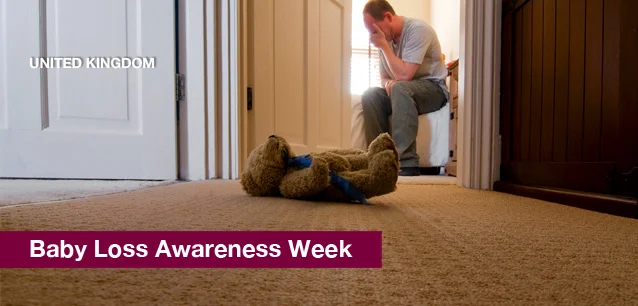 AD
AD
Today is: January 01
Scroll to explore events active on this date.
LEEP INK FEATURES

August? Absolutely!
In August, we live through the Dog Days of Summer. It's hot and often humid, and those who can leave for better climates do. Down south, winter is in full force. August is also known as "the ...

In The Heat of July: July 2025 Events
Is it hot enough (or cold enough if you're below the equator) for you yet? There is actually a day for that! Like every month, I pick a diverse collection of events you may or may not know about. This ...

May Blooms: Events in May 2025
Along with October, May is one of the most densely packed months of the year. It's before the summer humidity and the last whole month of the school year. The weather is warming in t...
About National Baby Loss Awareness Week in the United Kingdom
Health , United Kingdom & Ireland
Ends: Oct 15, 2023
DESCRIPTION:
Baby Loss Awareness Week runs in October each year. It is an opportunity for bereaved parents, family members, and friends to commemorate their babies' all-too-brief lives, knowing that thousands of other families elsewhere in the world will be doing the same. The week also provides a crucial opportunity for people to talk openly about the subject and raise awareness of baby loss.
The week ends with Baby Loss Awareness Day on October 15th, a date recognized as Pregnancy and Infant Loss Remembrance Day worldwide.
Here in the UK, we invite you to participate in the global 'Wave of Light.' Light a candle at 7 p.m. and leave it burning for at least 1 hour. This can be done individually, in a group, at home, or in a communal space. Wherever you do this, you will unite with others worldwide in honor of those babies who lit up our lives for a short time.
History of Baby Loss Awareness Week
October 15th, 2002, was the inaugural Baby Loss Awareness Day in the UK and was initiated by a group of parents inspired by Pregnancy & Infant Loss Remembrance Day in the United States. Through the sale of handmade blue and pink ribbon pins, they raised several thousand pounds for UK organizations supporting bereaved parents.
2003: The campaign saw the day expanded to a week with events across the UK. The first official 'Wave of Light' service in the UK was held at the American Church in London and attended by representatives and members of each participating organization. There were also services held across the UK from Scotland to Surrey. Once again, the ribbon pins were made and sold by bereaved parents.
2004: The campaign was a more formal collaboration between the five organizations involved, which included Sands, the Miscarriage Association, the Ectopic Pregnancy Trust, ARC, and Babyloss.com. The ribbon pins were commercially manufactured, and balloon releases were held in several locations. The group organized a secular service at the Royal Statistical Society in London, with over twenty other events around the UK.
In 2006, the distinctive two-color ribbon was introduced, and bereaved parents once again made the ribbon pins with the help of their family and friends.
Since 2010, Sands, the stillbirth and neonatal death charity, has played a pivotal role in the organization of the week and, since 2014, has taken a lead role in promoting the week as part of its work raising awareness of the issues surrounding pregnancy and baby loss in the UK.
VIDEOS
Currently, this event does not have supporting videos.
SUPPORTING DOCUMENTS
Currently, this event does not have supporting documents.
ADDITIONAL IMAGES
Currently, this event does not have supporting images.
Where would you like to go now?
 AD
AD


/footer-logo.svg)
